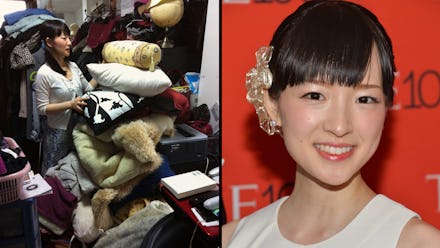Marie Kondo: Why a tidier life is a richer — and happier — one

You might already realize excessive belongings, messy habits and a disorderly home can drain away cash and valuable time. But fixing these problems — by, say, tossing clutter so you can stop paying for storage space, selling clothes you never wear, cancelling forgotten subscriptions and winnowing down your piles of financial papers — won’t just save you time and money.
In fact, the acts of cleaning and organizing can be transformative, leading you to sharper self-awareness, higher productivity, more deliberate decision-making and greater success, according to bestselling author and tidying consultant Marie Kondo. In an exclusive email interview with Mic, Kondo said overcoming the decision overload that comes with tidying requires starting with one simple premise: You should plan to let go of any items that don’t stir positive emotions.
“By learning to choose what possessions spark joy, people can be more mindful of their overall happiness,” Kondo said. “By surrounding themselves” with only those bliss-bringing objects, “people hone their sensibilities to what makes them happy.”
In a sense, Kondo said, the process of tidying — and discerning your truer priorities — helps you know yourself more deeply than before: “This leads to living a happier life and focusing on the tasks that contribute toward achieving goals, whether it be human relationships, career choices or other areas.”
Read on to learn more about how the author of Spark Joy and The Life-Changing Magic of Tidying Up suggests we use her lessons to achieve success. This interview has been edited for length and clarity.
Mic: How can you justify throwing away expensive items?
Marie Kondo: Regardless of price, the only criterion for keeping an item should be whether it sparks joy. I advise people to let go of things in ways that they feel comfortable, whether it be donating, selling or discarding. For example, some of my past clients donated everything they were letting go of, happy that these items found a new home. Some others weren’t comfortable with the idea that someone would be using their past belongings and decided to discard some. You should find a way that feels best for you, while of course being environmentally conscious.
What is a major error we make when trying to tidy and simplify?
MK: The biggest mistake people make is to focus on what to discard instead of what to keep. If you focus on this, you look for flaws ... and cannot appreciate the things you own. The correct mindset is to keep what you love instead of throwing out what you don’t like. The best advice I have ever received in this regard came from my grandmother. She always cherished her things and kept her home neat and tidy, even parts where nobody could see. She taught me the importance of valuing and taking care of each item I own.
Is there a way to apply the KonMari method to your finances and/or your career?
MK: The KonMari method can be applied to any area of life. You can discern which projects at work excite you and spark joy. The method can teach you to become a mindful shopper and cut back on unnecessary expenses. If you find you are buying more than you should, asking yourself whether an item sparks joy before purchasing it can prevent you from getting things you don’t need.
How do you organize and decorate without spending a fortune?
MK: These items don’t necessarily have to cost a fortune. For example, children’s paintings can be framed on the wall. By taking better care of what you already own and love, you can avoid purchasing decorative items just for the sake of decorating.
What’s the easiest possession to get rid of that we don’t realize we’re clinging to?
Marie Kondo: The easiest possession to let go of depends on the person who is tidying. At the core, the KonMari method is about revisiting and appreciating the relationship people have with their belongings. I encourage people to begin with clothing, since they are easy to replace and generally have less sentimental value. However, for some people clothing is the most difficult category, especially when it represents memories from the past. It really depends on the individual and their history.
Is there a smart strategy for buying fewer, more versatile work clothes?
MK: If you tidy your closet thoroughly, you also begin to understand the kind of items you already own. This enables you to make better decisions about what to add to your wardrobe and what you don’t need more of.
Is there any item that creates clutter you’ve kept for sentimental reasons?
MK: I have a hard time letting go of my children’s toys. They do create clutter, but it makes me smile to see my daughters playing with them.
Sign up for the Payoff — your weekly crash course on how to live your best financial life.